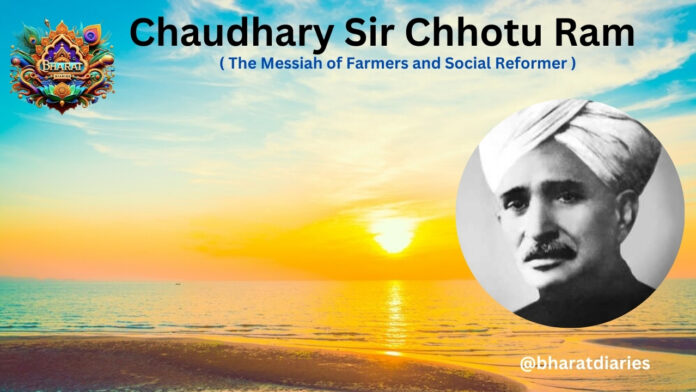
Discover the inspiring journey of Chaudhary Sir Chhotu Ram, a visionary leader who fought for farmers’ rights and reformed Indian agriculture. Learn about his contributions and legacy.
Table of Contents
Chaudhary Sir Chhotu Ram was one of India’s most influential social reformers and political leaders, particularly in the pre-independence era. His contributions to the upliftment of farmers, laborers, and marginalized communities remain a beacon of inspiration. Known as the ‘Messiah of Farmers,’ he dedicated his life to empowering rural communities and protecting them from exploitation. His efforts led to significant agricultural and economic reforms that benefited millions. This blog explores his life, achievements, and enduring legacy.
Early Life and Education
Born in a humble family in Garhi Sapla village of Haryana’s Jhajjar district, Chhotu Ram’s childhood name was RIchhpal. However, being the youngest in his family, he was lovingly called ‘Chhotu,’ which later became his popular name. Coming from an agrarian background, he experienced firsthand the struggles faced by farmers and laborers.
His early education took place in a middle school in Jhajjar, after which he joined a Christian Mission School in Delhi. Financial difficulties, however, made it challenging for him to continue his studies. Despite these hardships, his determination never wavered. He later graduated from St. Stephen’s College, Delhi, and went on to earn a law degree in Agra. His education played a crucial role in shaping his views on social justice and economic reforms.
https://bharatdiaries.com/jayaprakash-narayan-the-revolutionary-leader-who-shaped-modern-india/
Awakening of a Revolutionary Mind
One incident that significantly impacted Chhotu Ram’s outlook was the mistreatment of his father by a local moneylender. Witnessing this injustice ignited his resolve to fight against the exploitation of farmers. This experience led him to take an active role in social and political movements advocating for farmers’ rights.
His first act of rebellion came during his school days when he led a protest against the discriminatory policies of the school administration. His fearless attitude and commitment to justice earned him the nickname ‘General Robert’ among his peers. This early activism laid the foundation for his future struggles against social and economic oppression.
Entry into Politics and Fight for Farmers’ Rights
Chhotu Ram’s entry into politics was driven by his desire to bring tangible changes to the lives of the rural population. Initially, he was associated with the Indian National Congress, but he later distanced himself from it due to ideological differences, particularly regarding Mahatma Gandhi’s non-cooperation movement. Chhotu Ram believed that working within the system would yield better results for farmers rather than outright rebellion.
Determined to address the grievances of farmers, he co-founded the Unionist Party, a political outfit dedicated to the interests of peasants and rural communities. His leadership and vision helped the party gain widespread support, leading to a historic victory in the provincial assembly elections.
Landmark Reforms and Contributions
As a minister, Chhotu Ram introduced several path-breaking reforms that had a lasting impact on Indian agriculture and rural economy:
1. Abolition of Exploitative Debt System
One of his most significant achievements was the enactment of laws to protect farmers from the clutches of moneylenders. He introduced the Punjab Relief Indebtedness Act and Punjab Debtors’ Protection Act, which prevented the confiscation of farmers’ land due to unpaid loans. These laws ensured that farmers could work on their land without fear of losing it to creditors.
2. Agricultural and Irrigation Reforms
Understanding the importance of irrigation for agricultural productivity, Chhotu Ram played a key role in the construction of canals and irrigation projects. His efforts led to the expansion of irrigation facilities, ensuring better water supply to farmlands and increasing crop yields.
3. Promotion of Cooperative Farming and Fair Pricing
To counter the exploitation of farmers by middlemen, Chhotu Ram advocated for the establishment of cooperative societies. These cooperatives provided farmers with access to fair credit and helped them sell their produce at reasonable prices. His vision laid the foundation for future cooperative movements in India.
4. Advocacy for Rural Education and Empowerment
Recognizing that education was key to empowerment, he pushed for the establishment of rural schools and institutions that catered specifically to the needs of farmers and laborers. His emphasis on vocational training helped many rural youth gain employment and financial stability.
Opposition to British Exploitation and Legacy
Although Chhotu Ram worked within the system, he was never a puppet of the British government. His ultimate goal was the welfare of the Indian agrarian community, and he never hesitated to challenge colonial policies that harmed farmers. His strong opposition to unfair taxation and exploitation made him a revered figure among peasants.
Even after his passing, his legacy continues to inspire generations. His contributions laid the groundwork for many agricultural reforms post-independence. His emphasis on farmer-friendly policies continues to resonate in India’s political and economic landscape.
Conclusion
Chaudhary Sir Chhotu Ram was not just a politician; he was a revolutionary who dedicated his life to the upliftment of farmers and laborers. His vision, reforms, and relentless efforts transformed the lives of millions and continue to influence Indian agriculture and rural policies today. As we remember his contributions, it is essential to carry forward his legacy by ensuring justice and fair opportunities for the agrarian community. His life serves as an inspiration for all those who strive for a just and equitable society.
